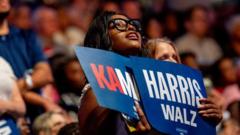On a warm autumn day at the University of Michigan’s Ann Arbor campus, the early voting center buzzed with energy as students queued to participate in the democratic process. With just a week until election day, many young women expressed their excitement about voting for Kamala Harris, viewing her as a significant role model. Third-year student Keely Ganong articulated her admiration, stating, “She’s just a leader that I would look up to to represent my country.”
Gender equality issues and personal rights, particularly regarding abortion, were at the forefront of conversations among students. Lola Nordlinger, a friend of Ganong's, emphasized the importance of women making their own choices: “A woman’s choice is something that’s so personal to her, and it really should be no one else’s decision.” Adrianna Pete, 24, a volunteer on campus promoting democratic engagement, noted a visible momentum among women voters, claiming, “I feel like a lot of women are rising up.”
Polling shows that Harris enjoys strong support among women aged 18-29, leading by 30 points, with a 38-point advantage specifically among college students, according to recent surveys. As the campaigns enter their final stretch, Harris hopes that these young women will turn out in record numbers, mirroring the 2020 trend that saw a significant increase in women voters.
Young activists, like Hannah Brocks, who has been actively campaigning for Harris through grassroots efforts, expressed a connection to Harris's empathetic communication style. “It’s just so much love and empathy in the way she talks about other people,” commented Brocks. Harris recognizes the critical nature of this demographic; higher turnout among young women could bolster her chances in tight races in battleground states like Michigan and Arizona.
Within the broader context, Harris's bid to sway essential demographics includes efforts to engage women who may not align strictly with her political views, particularly white, non-college educated women who traditionally lean toward Republican candidates. Pollster Evan Roth Smith notes that while many of these women trust Republicans on economic issues, abortion rights could serve as a pivot towards supporting Harris.
In Arizona, voters face a pivotal ballot question regarding the right to abortion, and local women express a desire for their voices to be heard. Mary Jelkovsky, representing a generation concerned about reproductive rights, shared her hope that this ballot question could inspire a significant turnout. As she noted, “This election couldn’t be more important for us.”
Amidst the evolving political landscape, Harris aims to galvanize support from disenchanted Republican women, such as Rebecca Gau, who described her shift from lifelong Republicanism, fueled by a desire for representation in a changing political climate. However, not all Republican women are swayed; some remain loyal to Trump despite their concerns over his demeanor. Tracey Sorrel articulated her policy-driven approach, expressing reluctance to support Harris’s stance on abortion.
As Kamala Harris’s campaign draws to a close, the focus on young women and their collective influence may prove pivotal—pushing for policies rooted in women's rights and aiming to bridge ideological divides across the political spectrum. As the country gears up for election day, the engagement of young female voters could ultimately shape the outcome in this closely contested election.





















